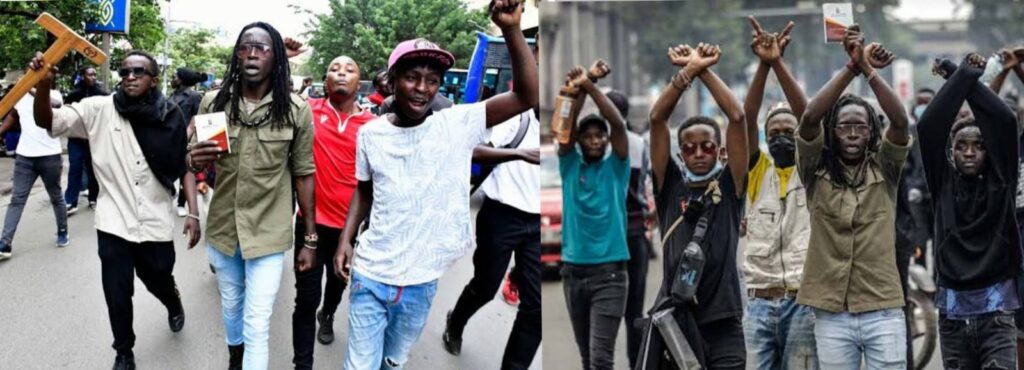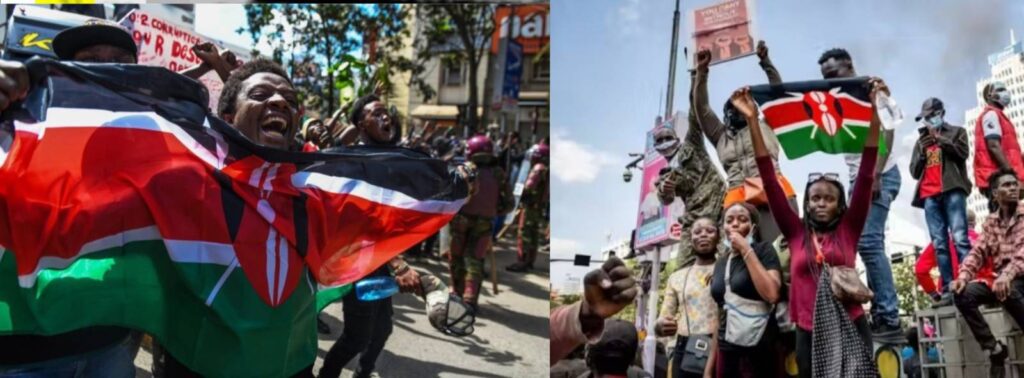Koert Lindijer has been a correspondent in Africa for the Dutch newspaper NRC since 1983. He is the author of four books on African affairs.
Over the past few weeks, a significant number of youthful activists in Kenya have been demonstrating. They are fed up with political elite that openly displays luxury items; gold watches and SUVs, and they are now unafraid to express their frustration.
At the end of last month, an extraordinary rebellion began in Kenya. On 25 June, young people stormed parliament and forced the members of parliament in session into an emergency tunnel; they had to leave the building in a hurry.
One parliamentarian lamented, “We are now pariahs,” in response to the public’s anger. Following a month of unrest resulting in fifty fatalities and hundreds wounded, the congregation still exits the church whenever a parliamentarian attempts to speak to them. Members of parliament have had their offices, businesses, and residences targeted in retaliation. Their offense? Supporting a tax hike on essential goods to address the budget deficit, as requested by the International Monetary Fund (IMF). Although the tax package has been revoked and some MPs are expressing regret on social media by wearing T-shirts that read, ‘Forgive us for our vote,’ the rage has not yet dissipated.
Robert Owero (40) was there on 25 June: “The courage, the masses, it was so special that day. In the past, protesters would run away if the police shot one of them dead. Now they first take cover, and then they crawl to the body of their comrade while bullets are flying around their ears, wrap it in a Kenyan flag and carry it away. If we had marched to the presidential palace that day, we could have taken it. The outburst of anger could no longer be stopped.” The demonstrations, albeit on a smaller scale, continues in numerous cities.

Mass demonstration
Although the police have now killed more than fifty protesters, the fear has disappeared. On the Sunday after the mass demonstration of 25 June, thousands of young people gathered in the central Uhuru Park in Nairobi to commemorate their fallen fellow protesters. They sang Unbwogable (‘I can’t be scared anymore’), a song their parents sang around the turn of the century in protest against the autocratic President Daniel arap Moi (1978-2002). These protesters are led by young, eloquent, well-educated and well-dressed Kenyans of Generation Z (roughly born between 1995 and 2010) who are not burdened with political or tribal loyalties. They put so much pressure on the current Kenyan president William Ruto that this usually arrogant politician now strikes a different tone. He withdrew the tax increases, fired his entire cabinet and the chief of police, turned to the young activists on X and promised a national discussion forum with youth, politicians and church leaders. But every concession is followed by new demands from the protesters.
“It’s amazing what we’ve achieved so far,” says Raymond Rono (26), who is brimming with self-confidence. “We are now determining the discourse, it’s our turn,” he says. He creates content on social media to encourage the protesters. “When we come together on the internet, we don’t even know each other’s faces. And yet we succeed with our plan. That gives a sense of power.” Kenyan media are calling it a Generation Z uprising. Directing the mass demonstrations via social media is reminiscent of Nigeria and Senegal, where the emerging digital youth rocked their countries in 2020 and the years after. Or of Sudan, where that young generation, armed with their smartphones, rallied against a Muslim fundamentalist dictatorship in 2019. In Kenya, one of the more democratic countries in Africa, the political game has always been played on the basis of tribal origins; political parties are coalitions of convenience for often corrupt leaders and businessmen. That political culture now seems to be shifting. “We don’t want to think like poor people anymore,” says Paulette Okoth (25). She too was demonstrating and chanting ‘Ruto must go’, she climbed on tear gas spitting police cars and took injured protesters to the emergency room. She has a multi-tribal background: her father is Kalenjin, her mother Somali. “We are the change,” she says, “we embody the technological revolution.” Her friend Emily Mutuko (24) comes across as equally self-assured; with her short skirt and wine-red lipstick she offends many an old African tradition. “My parents were poorly educated and much less politically aware. But we mirror ourselves with what we see on social media. We didn’t experience the terror under Moi, we are not traumatized.”
Demographics play a crucial role. Kenya’s population was under nine million when it gained independence in 1963, but it has since surged to over 55 million after the year 2000. The younger generation has modernized, and women have gained more freedom, thanks to improved education, urbanization, and notably, the internet. While millennials may have criticized the abuse of power and poor governance with sorrow, Generation Z is now using online platforms to voice their opinions and actively fight against the arrogance of power. Out of the 1.5 billion Africans, around 400 million are active on social media. Nigeria and Kenya lead the world in daily hours spent on these platforms. Emily Mutuko says “We debate on X. TikTok is about what we experience, preferably told with humor and creativity,”

Demographic time bomb
Kenya has about 18.4 million Gen Zs, representing about a third of the total population. Despite being the most educated group, they also face high rates of unemployment. With 800,000 graduates entering the job market each year, the prospects for employment are bleak. This demographic group has long been a ticking time bomb, but recent tax increases by Ruto have exacerbated the situation.
Kenyan society can be likened to an oasis of prosperity amidst a vast sea of poverty and unemployment. This stark inequality was once tolerated to some extent. Kenyans would often seek favor from corrupt politicians, who in turn would assist with school fees, medical bills, and even building a road around election time. Young people would remain silent in the presence of their elders, and hide in fear when the school headmaster visited their homes. The prevailing attitude at that time was to follow the lead of the wealthy and admire them unquestioningly.
With today’s keyboard warriors, things are different. “The government steals from the poor to enrich the super-rich. We are disgusted by this political class, with their gold watches, belts worth hundreds of dollars and diesel-guzzling SUVs,” fulminates demonstrator Leonorah Okeyo (24). “Politicians are not even ashamed of their ostentatious behavior, on the contrary, they show up at church services and buy their followers by donating stacks of banknotes. The government finances expensive offices for the wives of the president, the vice president and the prime minister. And what does the president’s wife do? She organizes a mass meeting with an American evangelist who comes to convert us. That’s what they do with our government money. It’s colonial behavior.” We are the generation that will stop this nepotism, say the Gen Zs confidently. We will not let the future be taken away from us.
But this leaderless movement is easy to corrupt. Their demonstrations are already being infiltrated by recruited, stone-throwing thugs. It raises the question of how Ruto will ultimately appease the discontent: with further concessions or with violence? The latter is to be feared.
According to columnist Tee Ngugi, Kenya has reached a crossroads. “Reforms of this broken system are not enough. What is needed is a complete break with the past,” he writes in The EastAfrican . “But for that, Ruto will have to take measures that are at odds with his nature and worldview.”


